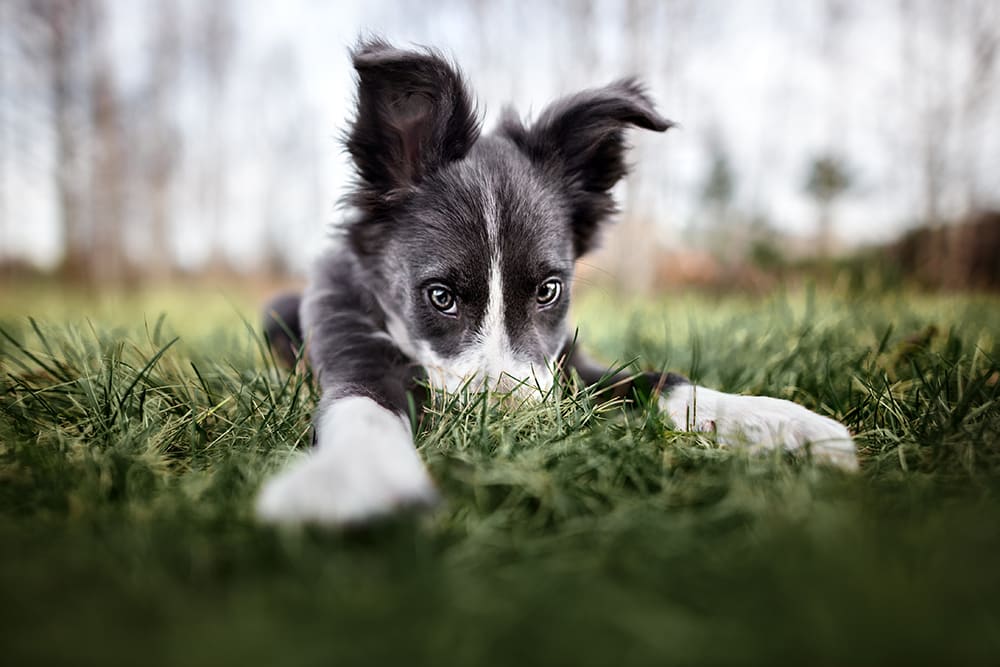Concerned pet parents often ask our Greensboro vets why their dogs keep eating grass, and whether this is a safe habit. Today, we share some reasons dogs may eat grass, and when it can become problematic.
Why do dogs eat grass?
Worried pet parents are often confused about why their dogs seem to love dining on grass. You may have even watched your dog eat grass, vomit, then return to eating grass again within a short period of time.
Is this an indication the dog feels that something in their stomach needs to be brought up? Has your pup eaten something toxic or poisonous? Are they attempting to self-treat an undiagnosed medical condition?
While some dogs will vomit after eating grass, this isn't the case for all dogs.
Physical Reasons Dogs May Eat Grass
Most dogs eat grass without displaying any signs or symptoms of stomach awesome. So, it seems unlikely that dogs would eat grass to induce vomiting. That said, physical reasons can include a lack of fiber in their diets. Because dogs are omnivores, their good health depends on plant foods in addition to high-quality meat. Fiber is needed to help keep their digestive system running smoothly, and eating a few blades of grass may be an easy way for your pup to get some roughage in their diet.
That said, if your dog is eating grass and showing signs of stomach upset, your pooch may have a medical problem. Dogs can be afflicted with numerous gastrointestinal issues such as inflammatory bowel disease or pancreatitis. If your dog is eating grass and exhibits other symptoms such as decreased energy, constipation, diarrhea or lack of appetite, we recommend booking an examination with your vet.
Psychological Reasons Why Dogs Eat Grass
Dogs often eat grass due to anxiety or boredom, in much the same way that pet parents will bite their nails. If your dog does not have any other symptoms of digestive issues but frequently munches on grass, the reasons for their behavior may be psychological.
If there's a good chance that your dog could simply be bored, try increasing the length, distance or intensity of their walks as a way to deter grass eating.
Separation anxiety could also be the reason that your dog is eating grass. Try leaving an old blanket or t-shirt with your scent on it with your dog when you leave the house. Your dog may find the familiar scent reassuring and help to curb their grass-eating habit.
Some dogs show obsessive behaviors. If your dog is obsessively eating grass, your vet will be able to advise you on how to help your pup reduce obsessive behaviors.
Is it safe for dogs to eat grass?
If your dog is otherwise healthy and on regular parasite prevention medication, eating grass is considered to be a safe behavior.
To help keep your grass nibbling pooch healthy, make sure that there are no herbicides, pesticides or fertilizers on the grass your dog enjoys.
Note: The advice provided in this post is intended for informational purposes and does not constitute medical advice regarding pets. For an accurate diagnosis of your pet's condition, please make an appointment with your vet.
Are you concerned about your pup's grass eating habit? Contact us today to schedule an examination with one of our experienced Greensboro vets.
Looking for a vet in Greensboro?
We're always accepting new patients, so contact our veterinary hospital today to book your pet's first appointment.
Related Articles View All
What happens during a routine pet exam?
Routine wellness exams are a proactive way to help safeguard your pet's long-term health and vitality. Why should you take your healthy pet to the vet? What happens during a pet health wellness exam? Find out.
How much does an emergency vet visit cost?
Emergency veterinary care can be costly, but planning ahead allows you to make decisions about your pet's care based on their needs rather than financial restrictions. Today, we look at the cost of emergency vet care, and how to be ready if your pet needs emergency treatment.
Kidney Failure in Dogs
Chronic and acute kidney failure are serious health problems commonly seen in dogs. Here, you will learn about the differences between chronic and acute kidney failure in dogs, the signs to watch for and how these conditions are treated.
Signs of Bladder Infections in Dogs & How They Are Treated
Many dogs suffer from bladder infections and other issues affecting the urinary tract system. What causes bladder infection in dogs? What signs should you watch for? How do vets treat bladder infections in dogs? Read on to find out.


